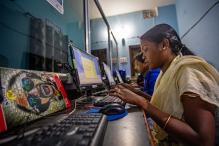On 4-9 May, researchers and practitioners gathered in the UK from across the world to discuss the latest in interactive technology at the ACM CHI Conference on Human Factors in Computing Systems. Hosted at the Scottish Event Campus in Glasgow, this premier international conference of Human-Computer Interaction (HCI) received more than 3800 submitted papers and around 700 were accepted.
UNU Institute in Macau Principal Research Fellow Dr. Hannah Thinyane had the opportunity to present a paper in CHI’s social justice theme about Apprise: an expert system developed to support frontline responders to perform proactive and consistent screening of workers in vulnerable populations for signs of labour exploitation and human trafficking. During the presentation, Hannah described the use of a value-sensitive design approach for Apprise, and a longitudinal evaluation of the system by frontline responders who work to identify signs of exploitation in vulnerable communities.
One of the key aspects highlighted in the paper was the participatory nature of the project. From a series of consultations with key stakeholders, initial ground research uncovered problems faced by frontline responders in identifying potential victims of human trafficking and forced labour. The Apprise team has cooperated with different key stakeholders, such as state actors and non-state partners who work with migrant workers in vulnerable situations in Thailand. Since the design case study in the fishing and seafood processing industry in Thailand, Apprise has been rolled out in several industries such as manufacturing, seafood processing, and for tackling sexual exploitation in the entertainment industry.
Using an iterative prototyping approach, the Apprise team designed and evaluated a series of prototypes. Using constant feedback from users to assess how technology supports workers in vulnerable situations, the Apprise team continues to work on improving the screening process using the value-sensitive design approach of “progress not perfection”. The Apprise project is moving on to a next phase looking at post-hoc analysis of screening responses for informing responsive anti-trafficking policy.
Resonating with the theme of CHI conference – ‘Weaving the Threads of CHI’, the Migrant Tech research team also looks forward to being interconnected and interwoven with innovative ideas, with hopes of fostering academic support, cooperation and exchange in the area of HCI.
People and organizations from different disciplines, cultures, sectors, communities, backgrounds – designers, researchers, practitioners – weaving together into one community, with the common purpose of technology that works for people and society.
Stephen Brewster and Geraldine Fitzpatrick, CHI 2019 General Chairs




